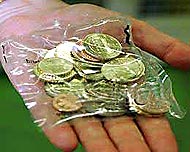 China has been snapping up euros to put in its foreign exchange reserves ahead of the single currency's debut in January.
China has been snapping up euros to put in its foreign exchange reserves ahead of the single currency's debut in January.
Central bankers said the prospective strength of the euro made sizeable reserves vital and China will increase its holdings next year.
Guo Shuqing, vice-governor of the People's Bank of China, said the country is not worried by fluctuations and slides in the currency's value, calling the exchange rate "inherently stable."
"We believe that in the medium and long term, the euro, backed by the European Union's (EU) economic strength, will be a fairly stable currency," he said.
"Stocks of the euro have been growing in our foreign reserves," Guo, also director of the State Administration of Foreign Exchange (SAFE), told a luncheon sponsored by the European Union Chamber of Commerce in China yesterday. "During the past two months we have bought a lot of euros. In the coming months, we'll buy more."
Underpinning China's support of the euro was the currency's role in the international currency system, the width and depth of European capital markets and the inherent stability of the exchange rate of the single currency.
China's foreign reserves stood at US$203 billion at the end of October, he said.
On January 1, euro banknotes and coins will be introduced, marking the conclusion of the changeover to the euro that started almost three years ago.
The euro's role as an international financing and investment currency has already increased substantially since it was introduced in money and financial markets of the 12 member countries on January 1, 1999, said Christian Noyer, vice-president of the European Central Bank (ECB).
But Noyer said the ECB takes a neutral stance in the internationalization of the euro, which ends the national currencies of member countries and their economic implications.
"This means it neither pursues the internationalization of the euro as an independent policy goal, nor does it attempt to hamper its use by non-residents," he said.
Guo said China's trade surplus is likely to shrink in the early years following its entry into the World Trade Organization, as growth in imports is expected to outpace that in exports. However he said the outlook for international balance of payments is optimistic, and the exchange rate of the renminbi will remain "basically stable," as China becomes more attractive to foreign capital.
(China Daily November 21, 2001)
